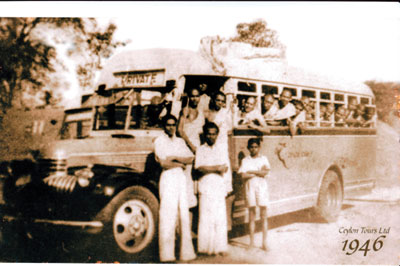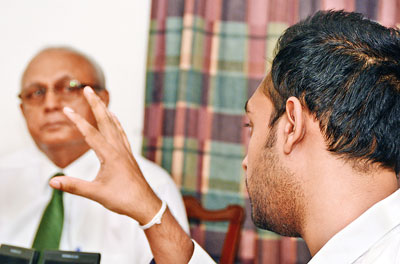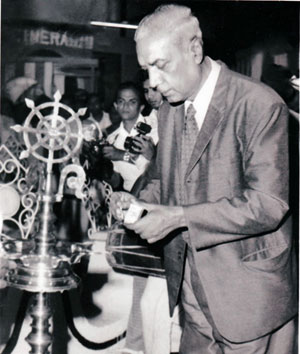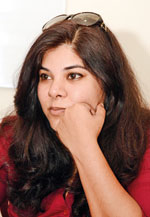Ceylon Tours: Top of the world for 70 years

Ceylon Tours’ first bus
It is 1946. The world has gone through a cataclysmic change and was in transition with a number of new countries being formed. Ceylon would soon regain its own identity after centuries of colonial rule, piggy-backing on India’s independence struggle. In Colombo a liner docked in at the port and waiting to greet passengers was a fleet of rickshaws. The dream of P.A. Ediriweera was bearing fruit. Edi, as he was called, started life as a journalist and had always had a delicious love affair with promoting this resplendent isle. He had opened Ceylon Tours Ltd which was his third big venture having previously owned hotels and a newspaper.
This last venture would be his lasting legacy for today Ceylon Tours celebrates its 70th anniversary proudly standing out as one of the top-of-the-line travel companies which has put Sri Lanka on the world map. This journey from transporting tourists in rickshaws around Colombo to air-conditioned limousines around the island will be celebrated by his children and grand-children on October 1. “Tourism was his love. He wanted to promote the country and he began Ceylon tours after dabbling in hotels and a newspaper. Looking back now, I have a great sense of pride at what he started and what we have achieved,” recalls son Suren Ediriweera.

Two generations: Suren and his son (Arosh)
Suren, the managing director of the company, is the fourth of Edi’s five children – the others being Mahen, Ranjani, Jinen and Chandra. They have, and continue, to play a part in the company’s operations with their children Arosh (Suren’s son) and Nushani (Chandra’s daughter) being the third generation to carry on the proud family tradition. It is 1956. Elvis has entered the music charts for the first time with ‘Heartbreak Hotel’. The world is still on a tinder box. Egyptian President Gamal Abdel Nasser has nationalized the Suez Canal. In Colombo, BOAC and TWA were bringing tourists. Travelling by ship was to become a thing of the past and soon to be only used by the well-heeled who had time on their hands.
“We were among a handful of tour companies operating at the time. There were others like Ceylon Carriers, Bobby Arnolda, Quickshaws but my dad believed in friendly competition. Whenever Ceylon Tours hosted a cocktail party he invited all the others. There was a harmonious relationship, no under-cutting as is the case these days,” Suren relates. Suren was born one year after Ceylon Tours began operating. Having schooled at Nalanda College he was then sent overseas (Switzerland and Germany) by Edi to study business management. The company still had its trademark tour of Colombo for tourists by rickshaw. Americans were by far their biggest customers.

Founder P.A. Ediriweera lighting an oil lamp
Vietnam war and Muhammad Ali
It is 1966. The Vietnam War was raging on. World heavyweight boxing champion Muhammad Ali refuses to be drafted and is stripped off his title. Both men and women in swinging London were wearing patterned pants. In Colombo, Ceylon Tours’ staff is reminded that they have to live by the company’s moto which is ‘personalised service’. Suren takes over: “My dad was a great believer in personalised attention. He knew everyone by name. He even knew the birthdays of tourists who came back. He was the epitome of old world charm.”
Ceylon Tours and the other handful of travel companies were the ones selling the country to the world. The Ceylon Tourist Board was only launched in May, 1966. A few months ago, in recognition for his pioneering and groundbreaking work, the Tourist Board gave a posthumous award to Edi which Suren accepted. “Our company was in the forefront of promoting this island way before the government got involved – 20 years before they began. In fact it was my father who suggested to the government at the time that they open an institution which would help lift the image of this country,” Suren revealed.
It is 1976. Only 14 years, Nadia Comaneci achieves the first ever perfect score of 10 in gymnastics at the Montreal Olympics. In the United States, a small company called Apple has just been established. In Argentina they don’t cry as President Isabel Peron is overthrown. In Colombo times are tough in the aftermath of the JVP insurrection and an era of bread queues as wheat flour is in short supply. “It was hard times as the country was in turmoil with the JVP insurgencies of 1971. But we still brought in the tourists.
Our numbers were still high despite the troubles,” says Suren who had joined the company in 1972 after completing his degree overseas. He began at the very bottom as a motor mechanic in the garage with Edi believing that he should learn every aspect of the business. Suren was a fast learner and soon moved on with the help of his dad as well as Lal Wijekulasuriya (“a pillar of strength who is still with us as director of operations and tours”) who was one of the pioneers of bringing in charter flights from Europe.

Nushani (Chandra Ediriweera’s daughter) Pix by Indika Handuwala
Soon after Suren joined the family business, his eldest brother Mahen came up with the proposal that the company should look at the Maldives as an alternative destination, what with all the troubles going on in the island in the 70s. It was a far-sighted suggestion. Ceylon Tours became the pioneers of tourism development in The Maldives. “When we went for the first time, the people there were plucking coconuts. We were the first travel agents to be involved in the Maldives and played a huge role in turning it into what it is today. In 1992, then President Gayoom presented Ceylon Tours with a certificate for our unstinted support to develop the tourism industry in his country.”
Unnecessary accusations
These efforts also ruffled some feathers in the Colombo government who charged that Ceylon Tours was undermining Sri Lanka by promoting the Maldives. “I was accused of being an ‘Alien’ by the then Minister of Tourism. I told her that we were compelled to do this because of the problems in our country and said others (travel companies) would soon follow suit,” Suren remembered. Like the Pied Piper, the rest did follow Ceylon Tours which still had Sri Lanka as it main destination offering travellers a stay in both countries. It is 1986. The space shuttle Challenger explodes shortly after taking off. On the ground things get worse with the world’s biggest nuclear disaster Chernobyl.
Maradona and his ‘Hand of God’ lead Argentina to World Cup glory in Mexico. In Colombo, Air Lanka has taken over from Air Ceylon and its jets are bringing down tourists in droves despite dark clouds looming over the island no thanks to a guy called Prabhakaran. With the onset of the jet age, Ceylon Tours was receiving back-to-back charter groups. In the past the largest tour group would comprise at most 15 people with the emphasis being on individual and family tours. Times were changing. “My dad opposed what he called “cheap traffic”. He had always been against charters bringing in huge number as he feared the personalised touch would be lost,” Suren recounts.
But the world was changing fast. Travel times were being cut drastically in the jet age. Edi retired in 1975, handing over the reins to his sons. The former owner of the Mount Lavinia Hotel, Grand Oriental Hotel and Queen’s in Kandy as well as the founder of The Times of Ceylon newspaper, passed away in 1986. A giant in the industry was no more. It is 1996. Charles and Diana get divorced. Dolly the sheep is cloned. Kofi Annan is elected as UN chief. In Colombo they are dancing in the streets after Arjuna Ranatunga and his men defeat Australia to lift the World Cup on a balmy night in Lahore.
The LTTE’s reign of terror is full-blown yet despite the anarchy the company still carried on going about its business, catering to tourists mainly from Britain, France, Germany, Austria and Switzerland. “It was tough but we still carried on. The best thing about our company was that we didn’t retrench anyone. My dad always looked after his staff and we carried on. There are generations of drivers who are with us. When the war was at its height, I remember our drivers offering to work without a salary. That is how committed everyone is, even today,” says Suren.
Saddam Hussein and the SL war
It is 2006. Saddam Hussein is hanged. Google purchases YouTube for US$1.65 billion in stock. Pluto is downgraded from a planet to a dwarf planet. In Colombo, the war is still going on. The LTTE is desperate and taking desperate measures. “We represented our country in travel and tourism conventions all over the world. I remember twice, when we went to London and Berlin for major shows, there would be a massive bomb going off in Sri Lanka killing scores of people.
The LTTE was smart and wanted to divert the attention of the world to the horrors going on,” says Suren. Despite all the obstacles of facing a pro-LTTE media in the West, Ceylon Tours still went on promoting the country. By now the company had grown rapidly in stature. It was represented on a number of international travel bodies including IATA (International Air Transport Association) and PATA (Pacific Travel Association) among others.
Peace at last
It is 2016. Present day. Britain has exited the European Union. The US might have its first woman president. In Colombo the war has been over for seven years but people are still waiting for the peace dividends. The Chinese is fast becoming the biggest source of tourists for the country but Ceylon Tours still hopes there is room for the high-end traveller. “This is the market we should be focusing on,” says Arosh Ediriweera, 29, and a director of the company.
“We should not forget the others but if Sri Lanka is to really benefit from tourism, then we must look at bringing in the big spenders rather than just thinking about numbers.” The world has moved on since Edi started his dream 70 years ago. But at its core, Ceylon Tours still is faithful to its founder’s vision which was to provide the traveller, now outbound too, with an experience which would not be forgotten. “I think we do this,” Suren sums up.


